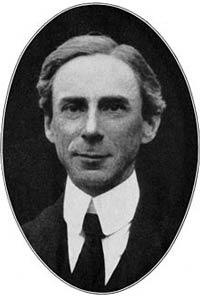
| Born: May 18, 1872 in Trellech, Monmouthshire, UK |
| Died: Feb 2, 1970 (at age 97) in Penrhyndeudraeth, Wales, UK |
| Nationality: British |
| Fields: Epistemology, ethics, logic, metaphysics, history of philosophy |
| Famous For: Anti-war and anti-imperialism activism |
Bertrand Russell was a British mathematician, social critic, logician and philosopher. He helped lead the British Revolution against idealism in the 20th century. He is known to be one of the developers of analytic philosophy together with his predecessor, Gottlob Frege, and his protégé, Ludwig Wittgenstein.
Early Years and Education
Bertrand Russell was born in 1872 in the town of Monmouthshire into a prominent aristocratic and liberal family in Britain. He was the second-born in a family of three. Russell won a scholarship to Trinity College to study mathematics. He was under the influence of Alfred Whitehead, who recommended him to the Cambridge Apostles.
He distinguished himself in philosophy and mathematics and graduated as a high Wrangler in 1893 and became a Fellow 1895. He married Pearsall Alys in 1894 before spending a few months studying social democracy in Berlin. Afterwards, they both went to Haslemere where he decided to study philosophy.
Russell’s Professional Life
Russell started his publishing career in 1896 with his German Social Democracy, which was a study on politics. This publication was an indication of his lifelong interest in social theory and politics. In 1896, he started teaching German social democracy in the London School of Economics. He also lectured on the power of science in 1937.
He started a comprehensive study of mathematics foundations at Trinity where he discovered the Russell’s paradox, which disputed the foundation of the set theory. In 1903, he published a book on mathematical logic entitled The Principles of Mathematics. In this book, he argued that mathematics could be deciphered from a small number of principles. This work contributed hugely to the logician’s cause.
In 1905, Bertrand became a lecturer at the University of Cambridge. He was later approached by Ludwig who was an Austrian engineering student who then became his Ph.D. student.
Russell’s Stance against War
During World War I, Russell was among the few people who engaged in pacifist activities. He was imprisoned for six months in 1918, but he still opposed the rearmament several years later against Nazi Germany in the Second World War.
Russell’s Contributions to Philosophy
In the late 1940s and 1950s, Bertrand participated in several broadcasts on the BBC in which he talked about various philosophical and topical subjects. He was invited to present the first Reith Lectures, which became an annual event that is still broadcast these days.
Russell’s series of lectures was entitled Authority and the Individual and he discussed the idea of an individual’s role in the formation and development of a society. He advocated for a “scientific society” in which there would be no war, the citizens of the society would share their prosperity, and the population growth would be limited.
Russell published A History of Western Philosophy in 1945 which became a bestseller and a source of income for Bertrand for the rest of his life. He won several titles and honors in his lifetime.
Russell’s Death
Bertrand died in 1970 of influenza. His body was cremated and his ashes were scattered over the Welsh Mountains.